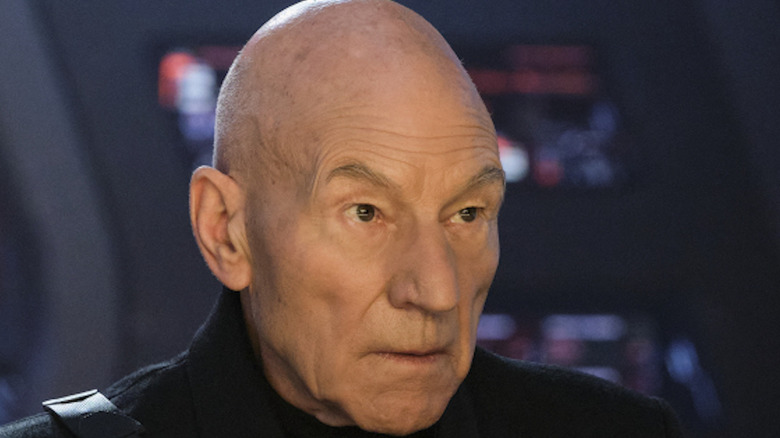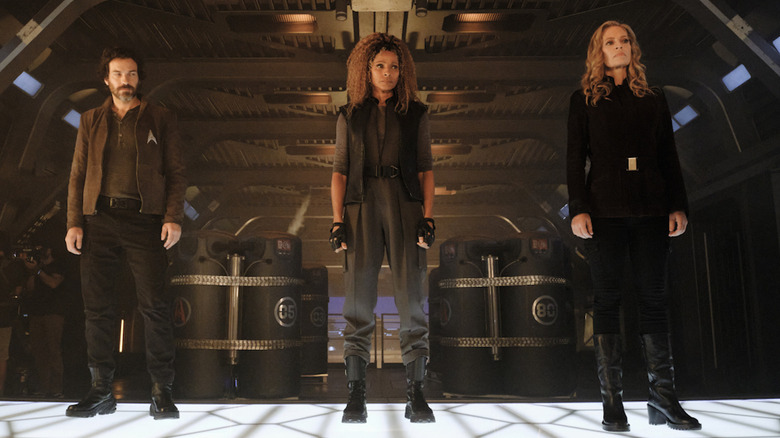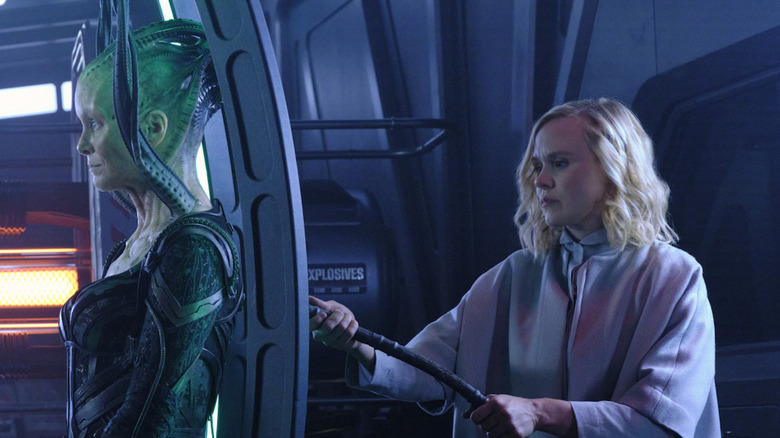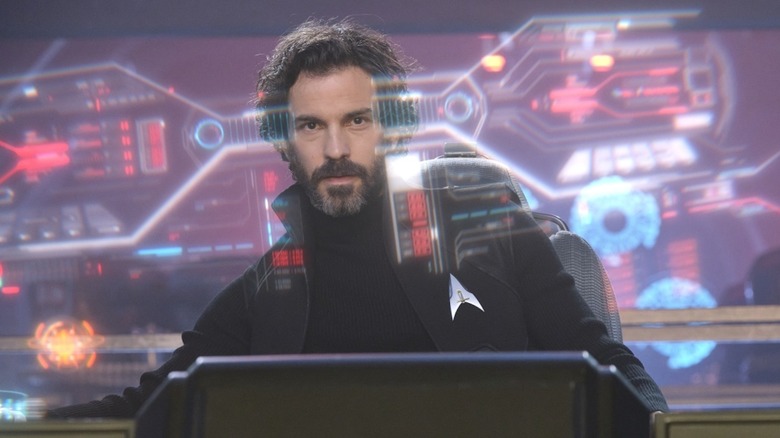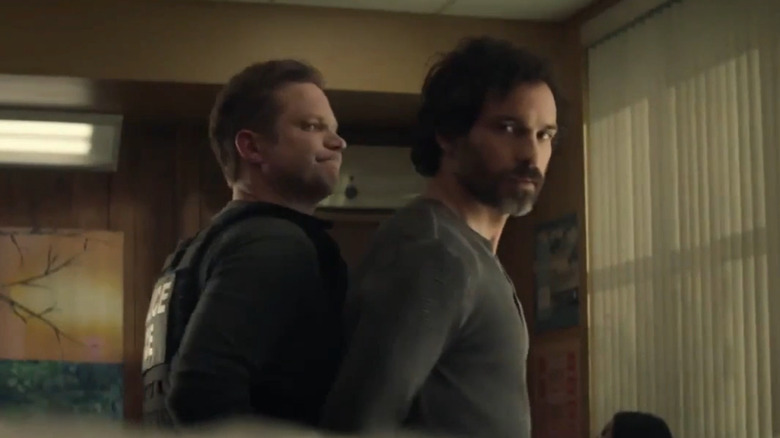The Ending Of Picard Season 2 Episode 3 Explained
Contains spoilers for "Star Trek: Picard "Season 2, Episode 3, "Assimilation."
When we left the crew of "Star Trek: Picard" in last week's episode, "Penance," our heroes had barely escaped the totalitarian Earth of Q's (John de Lancie) altered timeline, where Jean-Luc Picard (Patrick Stewart) finds himself a brutal general of the human-supremacist Confederation, with Seven of Nine (Jeri Ryan) as the regime's president. Agnes Jurati (Alison Pill) manages to beam Picard, Seven, Elnor (Evan Evagora), Raffi Musiker (Michelle Hurd), the Borg Queen (Annie Wersching), and herself aboard the La Sirena, where Captain Rios (Santiago Cabrera) awaits them. But we are left in a tense showdown when several Confederates beamed up after them.
As it turns out, escaping the Confederation is relatively easy. Directed by Lea Thompson, "Assimilation" picks up right where we left off. The crew blasts away the baddies, takes out the Confederation ships with some help from the Borg Queen, then slingshots around the sun at warp speed, and time travels to the year 2024. After a crash landing disables most of the ship's power, Elnor succumbs to his injuries. The remaining crew forms a plan: Seven, Raffi, and Rio will seek out the mysterious "Watcher," who the Borg Queen says will know how to fix the timeline. Meanwhile, Picard and Jurati stay on the ship to extract more precise information from her and get the ship's power restored.
With the group separated on their respective missions, the last leg of the episode focuses on the predicaments they find themselves in as their time travel journey becomes more difficult than they hoped. Earth in 2024 is a dangerous place, and the Borg Queen remains a wily, terrifying foe to tangle with.
Seven and Raffi search for the Watcher
When Raffi, Seven, and Rios beam from the ship, only Raffi and Seven of Nine end up together. They find one another in one of the many displacement camps scattered around 2024 Los Angeles. These camps are, in "Star Trek" history, the site of a series of uprisings called the Bell Riots, which also take place in 2024 and mark the start of global unrest culminating in World War III. As they walk amongst the impoverished masses society has tossed aside, Raffi remarks, "I've never been able to understand how a society could exist with so many contradictions and not collapse sooner than it did." Does she know she might be around to see it happen? The episode doesn't make that clear.
The pair make their way to the top of an L.A. skyscraper, with Seven improvising a quick story about wanting to take an engagement photo with her bride-to-be to get past a security guard. Once there, the pair attempt to locate any futuristic tech that might reveal the Watcher's whereabouts. There's a quick ping near their location, which then disappears, and then they see the signal from Rios' badge, which appears to be on the fritz. In reality, the badge has fallen into the hands of a little boy who keeps pressing the button on it like a fidget toy.
With Rios captured by the end of the episode, it looks like it will be up to Seven and Raffi to rescue him. Given Raffi's crush on Seven, which she tells Picard about in Episode 1, there might be time for a bit of romance along the way. Meanwhile, back on the ship, Picard and Jurati have a tense showdown with the Borg Queen.
Jurati outsmarts the Borg Queen
Jurati suggests allowing the Borg Queen to assimilate her to glean information about the Watcher, claiming it will be fine because it will only be partial assimilation. Picard, who speaks from experience, tells her, "Halfway to hell is still not a recommended destination." Jurati still goes through with it. Picard disconnects her from the Queen before she can be fully taken over, but even so, Jurati passes out from the mental strain.
The queen awakes later and tells Picard that if he wants information from her, she wants the La Sirena in return. She tells him his capitulation to her demand is inevitable since Picard is incapable of sacrificing the many for the sake of the few. "I hold information you need," she says. "You, against all odds, hope I'll relent. Therefore, you won't deactivate me."
Meanwhile, Jurati is one step ahead of the Queen, asking her if she's sure she knows the information she's ransoming. The Queen, alarmed, realizes she's missing the location of the Watcher. Jurati stole it from her mind while the two were connected. Jurati requests the ship's computer to access the file, and it reads back the coordinates. However, while Picard and Jurati now have the location of the Watcher, they don't know when the timeline-altering event happens. Jurati can't quite recall it, though she says it will come to her.
"What you have done here is more difficult and vastly more dangerous than you realize," the Borg Queen says. Unfortunately, with the rest of the ship's crew scattered around Los Angeles, relaying this newly acquired information to them won't be a simple task, and the Borg Queen is sure to have more tricks up her tendrils than anyone suspects.
Rios has a harrowing encounter with Homeland Security
While Seven and Raffi scout for the Watcher, Rios has a very different adventure. The ship's transporter drops him two stories in the air, and he sustains serious injuries. Since Rios has no ID and refuses hospitals or cops to avoid butterfly effects in the timeline, the people who find him bring him to a clinic specializing in the treatment of undocumented migrants. He tries to charm his way out of the clinic as soon as possible, but he's too concussed to leave. Meanwhile, the son of a doctor treating Rios gets his comms badge, which causes the strange signal picked up by Seven. When he tries to get it back, the doctor puts it out of reach.
Just as Rios is ready to leave, the clinic becomes the site of a surprise raid by US Immigration and Customs Enforcement officers. It's a brutal reminder of the injustices of our own times, a blatant example of xenophobia not so different from the fascist Confederation brought about by the dastardly Q's timeline meddling from which the crew just escaped. Rios helps the other patients escape out the back door, but he's unwilling to leave his badge behind, so he puts on a lab coat and pretends to be another doctor. An ICE officer notices his fresh wounds, pegs him as a patient, and arrests him along with a doctor (Sol Rodriguez). The badge is left sitting on the lobby desk, and as the officers drag Rios out the door, Picard's voice echoes into empty ears before a smash to the end credits.
Los Angeles is a powder keg, and Picard's crew might be the spark to ignite it
Although the first three episodes of Picard Season 2 have been a slow burn, it seems like the gears of the plot are finally turning, and most of the season will likely remain in the near future of Los Angeles rather than the alternative, dystopian far-future created by Q. Current showrunner Akiva Goldsman told Collider Interviews, "I think the [first] three episodes are delightful and exciting and a little bit deceiving, only in that now the show slows down. Now, it sort of lands in our present and stays there until the end of the show."
For viewers who were intrigued by the fascist alternate version of the "Star Trek" universe featured in Episode 2, that may be disappointing, but it's worth remembering that many of the most beloved "Star Trek" chapters have taken place closer to our own time. From Harlan Ellison's masterpiece "The City on the Edge of Forever" to the fan-favorite movie "Star Trek IV: The Voyage Home," revisiting a time closer to our own and seeing how far we currently are from the utopian society envisioned by Gene Roddenberry and his collaborators — and more importantly, how we might still get there — has always been rich soil for "Star Trek" to dig into.
Going forward, it seems "Picard" Season 2 wants to explore both its titular character and his crew on the ground, which is unfamiliar for them but all too familiar for fans. Looking at the people in the streets of Los Angeles and the ICE raid on Teresa's free clinic, it's clear the show wants to foreground the deeply unstable society of the 2020s. As Goldsman put it, "I think Star Trek has always been uniquely good at [...] shining a light on our times" (via Vegas Film Critic).
